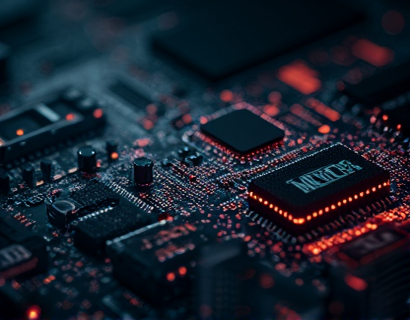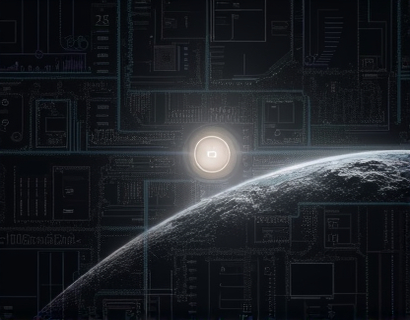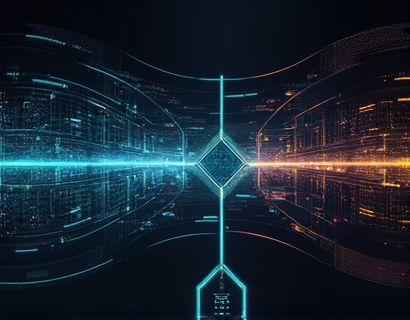Decentralized Innovation: Revolutionizing Global Blockchain Collaboration Through Comprehensive Platforms
The advent of blockchain technology has ushered in a new era of decentralization, offering unprecedented opportunities for collaboration, innovation, and governance across global networks. At the heart of this revolution is the development of comprehensive platforms designed to enhance the capabilities of decentralized systems. These platforms serve as the backbone for a new paradigm in blockchain interaction, enabling enthusiasts and innovators to collaborate more effectively, share resources, and engage in collective decision-making processes. This comprehensive guide delves into the transformative impact of such platforms, highlighting how they drive global efficiency and scalability in the blockchain space.
Decentralized innovation is not just about creating new technologies; it's about building ecosystems that foster collaboration and shared growth. Traditional centralized models often limit participation and stifle creativity, whereas decentralized platforms empower a broader range of stakeholders to contribute to the development and evolution of blockchain networks. By removing barriers to entry and promoting open participation, these platforms democratize access to tools, resources, and knowledge, thereby accelerating the pace of innovation.
Enhancing Collaboration
One of the primary benefits of comprehensive decentralized platforms is their ability to enhance collaboration among blockchain enthusiasts and innovators. These platforms provide a centralized yet decentralized space where individuals and organizations can connect, share ideas, and work together on projects. The removal of intermediary constraints means that collaboration is more direct, efficient, and transparent. Users can engage in real-time discussions, share code and data, and coordinate efforts with minimal friction.
For instance, these platforms often feature integrated communication tools such as chat forums, video conferencing, and project management boards. These tools facilitate seamless interaction, ensuring that all participants are aligned and informed. The transparency inherent in blockchain technology ensures that all actions and decisions are recorded and visible to all, fostering trust and accountability within the community.
Fostering Innovation
Innovation thrives in environments where ideas can flow freely and be built upon collectively. Comprehensive decentralized platforms provide the necessary infrastructure to nurture this process. By offering access to a wide range of resources, including open-source libraries, development tools, and best practice guidelines, these platforms lower the barriers to entry for newcomers and enable experienced developers to push the boundaries of what is possible.
Moreover, these platforms often incorporate features that encourage experimentation and risk-taking. Sandbox environments, for example, allow developers to test new concepts and protocols without the fear of disrupting live networks. This safe space for experimentation is crucial for driving innovation, as it enables the exploration of novel solutions and the rapid iteration of ideas.
Improving Governance
Effective governance is a cornerstone of successful decentralized networks. Comprehensive platforms play a pivotal role in enhancing governance mechanisms by providing tools and processes that promote transparency, inclusivity, and efficiency. Decentralized autonomous organizations (DAOs) are a prime example of how governance can be revolutionized through blockchain technology.
DAOs enable community-driven decision-making, where stakeholders can propose, discuss, and vote on proposals that affect the network. This democratic approach ensures that governance is aligned with the collective interests of the community, rather than being dictated by a centralized authority. Comprehensive platforms can integrate DAO functionalities, streamlining the proposal, discussion, and voting processes, and ensuring that outcomes are executed transparently and efficiently.
Driving Global Efficiency and Scalability
The global nature of blockchain networks requires solutions that can scale effectively and operate efficiently across different regions and time zones. Comprehensive decentralized platforms are designed with scalability in mind, leveraging advanced technologies and architectures to handle increasing amounts of data and user activity. These platforms often employ sharding, layer 2 solutions, and other optimization techniques to ensure that the network remains performant and accessible to all users.
Furthermore, by facilitating global collaboration, these platforms help overcome geographical and cultural barriers, enabling the formation of diverse and dynamic communities. This global reach not only enhances the resilience of blockchain networks but also accelerates the adoption and implementation of blockchain solutions worldwide. The shared knowledge and resources available through these platforms enable regions with varying levels of technological advancement to contribute meaningfully to the ecosystem.
Case Studies and Real-World Applications
To better understand the impact of comprehensive decentralized platforms, let's explore a few real-world applications and case studies. One notable example is the use of decentralized marketplaces that connect developers, investors, and users from around the globe. These marketplaces leverage blockchain to ensure secure transactions, transparent reputation systems, and community-driven governance. By removing intermediaries, these platforms reduce costs and increase the efficiency of the ecosystem.
Another application is in the realm of decentralized research and development. Collaborative research projects can benefit from shared data repositories, joint development environments, and coordinated funding mechanisms. Comprehensive platforms can facilitate these processes, enabling researchers to pool their resources and expertise to tackle complex challenges in areas such as cryptography, smart contracts, and decentralized finance (DeFi).
Challenges and Future Directions
While the potential of comprehensive decentralized platforms is immense, there are several challenges that need to be addressed to fully realize their benefits. One major challenge is the technical complexity involved in building and maintaining such platforms. Developers must have a deep understanding of blockchain technology, distributed systems, and security best practices. To overcome this, platforms can offer educational resources, tutorials, and support to help users get started and advance their skills.
Another challenge is the need for standardization and interoperability across different blockchain networks. As the ecosystem grows, ensuring that platforms can seamlessly integrate with various blockchain protocols is crucial for fostering a cohesive and interconnected global network. Industry-wide efforts to develop common standards and protocols can help address this issue.
Looking ahead, the future of decentralized innovation is promising. As more organizations and individuals recognize the benefits of comprehensive decentralized platforms, we can expect to see increased adoption and further advancements in technology. The integration of emerging technologies such as artificial intelligence, quantum computing, and the Internet of Things (IoT) with blockchain will open up new possibilities for collaboration, innovation, and governance. Comprehensive platforms will continue to play a vital role in harnessing these technologies to build a more decentralized and resilient global network.
In conclusion, comprehensive decentralized platforms are revolutionizing the way blockchain networks operate, driving global efficiency and scalability through enhanced collaboration, innovation, and governance. By providing a robust and inclusive ecosystem, these platforms empower a diverse community of enthusiasts and innovators to shape the future of decentralized technology. As the blockchain landscape continues to evolve, the importance of such platforms will only grow, paving the way for a more decentralized and interconnected world.











































